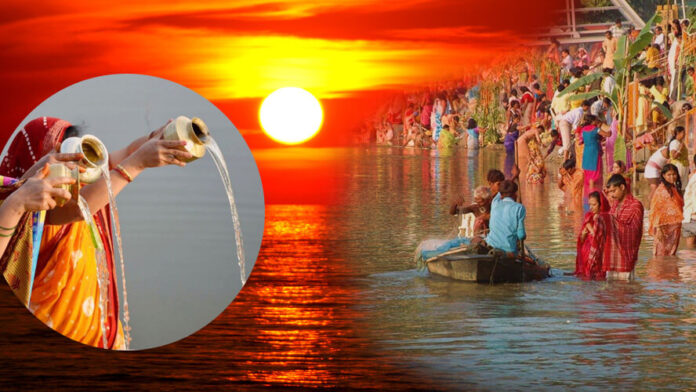EW News Desk:
Chhath, a festival celebrated with unwavering determination, transcends mere rituals and embodies the essence of humanity’s connection with nature. Originating from the heartlands of India, Chhath is not just a religious observance but a spiritual journey, a communion with the natural elements that sustain life.
The festival revolves around the worship of the Sun God, symbolizing the source of all energy and life on Earth. Devotees offer prayers to the setting and rising sun, standing waist-deep in water bodies, a practice that exemplifies their commitment to environmental harmony.
Chhath is not just a cyclical celebration; it encapsulates the fundamental principles of nature. It is a manifestation of the eternal cycle of birth, death, and rebirth – a reflection of the perpetual rhythm of life.
The holistic approach of Chhath doesn’t distinguish between beginnings and endings; it perceives them as integral parts of the grand tapestry of life. It encourages us to embrace both the sunrise and sunset with equal reverence.
Embedded in the rituals of Chhath is the vision of eternal existence, an aspiration for the immortality of civilization and the perpetual victory of the soul. Chhath is not merely a festival; it is a celebration of life itself. It is a commitment to the principles that govern life and the conscientious adherence to those principles.
Chhath is a resolve to establish the rules of life, and it encourages the followers to abide by these principles diligently. The festival not only sets the rules but also teaches the importance of adhering to them.
The Arghya (offering) during Chhath is symbolic of the dedicated practice of various yoga postures, promoting physical and mental well-being. Chhath is a homage to rivers, a worship of the sun, and a celebration of traditions. It is a testament to the rich tapestry of India’s cultural heritage.
Chhath encompasses the unwavering determination seen in rivers, the flowing waters, the rising sun, the toil of farmers, and the devotion of Chhath devotees. In its entirety, Chhath reflects the path of Ashtanga Yoga, encapsulating the eight limbs of yogic practices.
As we celebrate Chhath, let us immerse ourselves in the rich tapestry of traditions, reconnect with nature, and embrace the cyclical rhythm of life that this festival so beautifully symbolizes. Chhath is not just a festival; it is a profound expression of human resilience, environmental reverence, and spiritual commitment.
Imagine a grand spectacle where devotees courageously offer their reverence to the revered Lord Bhasakar during the mesmerizing Chhath Puja. As the setting sun receives offerings, it becomes a symbol of divine power. Witnessing this unparalleled human connection with the cosmic force, the sun, leaves an indelible emotional impact. Thousands offering arghya to the setting sun transform it into a majestic, powerful entity, and the fading rays emanate a profound sense of self-esteem. In these moments, rivers stand still, captivated by this extraordinary human connection, and time seems to pause, bathing everyone in celestial bliss.
When an individual, in a state of self-imposed austerity, dedicates themselves to the sun, a unique bond between nature and the individual unfolds. This bond signifies the elevation of human nature above itself. It echoes the belief that nature is divine until the sun sets. The person, a part of nature, holds it in reverence and, through Chhath, showcases this relationship reminiscent of the connection between the soul and the supreme soul. Chhath, beyond being a cultural celebration, embodies gratitude towards the sacred rivers—Ganga, Yamuna, Son, Ghaghara, Sarayu, and countless others.
Rivers and sunbeams have nourished humanity throughout history. Great civilizations and cultures have thrived due to the harmony between rivers and the sun. Chhath, by celebrating the waters and the sun’s rays, becomes a manifestation of gratitude for these natural sources. The festival manifests the cultural richness of North India, where life revolves around the Ganga, her sisters, and the divine Lord Bhasakar.
Imagine a collective offering of arghya to the sun by everyone. Such a vast communal expression of gratitude would humble any civilization before the forces of nature. It emphasizes that we exist because of nature, rivers, the sun, and water bodies. Chhath is a celebration of this collective gratitude, a festival that reflects our acknowledgment of the unseen gravitational force that draws the sun and the societal attraction towards rivers and water bodies.
Chhath brings society together, encouraging conversations at the riverbanks. A massive gathering, discussing a single topic at a particular time, dissolves societal divisions. In the presence of nature, distinctions of color, caste, and social status lose their significance. Chhath Puja initiates a social dialogue, fostering unity and breaking down barriers.
Preserving festivals like Chhath is crucial for nurturing traditions and passing them down to future generations. Understanding the essence of the elements involved, acknowledging their broader significance, and embracing these meanings socially ensures a robust society. Chhath is not just a celebration; it is a continuous affirmation of gratitude, a celebration of life, and an opportunity to build a society in harmony with nature.
Chhath Puja is not merely a cultural event; it is a divine convergence of humanity and nature. Through this celebration, we not only express gratitude but also establish a connection with our roots and traditions. As we continue to celebrate Chhath, let us strive to comprehend its profound meanings, promote social harmony, and contribute to the evolution of a society that respects and values nature. In doing so, we uphold the cultural richness of our land and pave the way for a vibrant and enlightened future.


